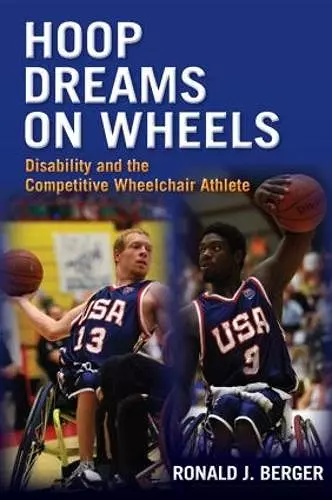Hoop Dreams on Wheels
Disability and the Competitive Wheelchair Athlete
Format:Paperback
Publisher:Taylor & Francis Ltd
Published:12th Sep '08
Currently unavailable, and unfortunately no date known when it will be back
This paperback is available in another edition too:
- Hardback£160.00(9780415965101)

This book offers a profound look into wheelchair athletics, examining personal histories and societal perceptions, particularly in Hoop Dreams on Wheels.
This sociological exploration delves into the world of wheelchair athletics, aimed at challenging societal stereotypes surrounding individuals with disabilities. Hoop Dreams on Wheels serves as a life-history study of athletes involved in a prominent collegiate wheelchair basketball program, intertwining personal narratives with broader historical and sociological contexts. It provides essential background on the evolution of disability sports, documenting the growth of the basketball program while sharing the unique life stories of its athletes.
The book highlights the formative experiences that shaped these athletes, emphasizing the interpersonal and institutional influences that contributed to their achievements in wheelchair sports. It also addresses the divisions within the disability community, revealing both empowering and disempowering dynamics inherent in competitive athletics. Through these narratives, Hoop Dreams on Wheels explores the complexities and dilemmas surrounding disability identity in today's society, offering insights into the lived experiences of these athletes.
Targeted at both a general audience and students in various disciplines, this book is a valuable resource for those studying disability, sports, and social issues. It will also appeal to scholars in the sociology of disability and sports, as well as professionals in therapeutic recreation and rehabilitative counseling, making it a comprehensive examination of the intersection of sport and disability.
The strength of this work is Berger’s embrace of complexity. In eschewing common dichotomies, Berger reveals the multifaceted lived experiences of wheelchair athletes with special attention to how they have forged their identities and understandings in particular historical, cultural and structural contexts. In so doing, he demonstrates the powerful interplay between human agency and social structure and between intended and unintended consequences. This informative, engaging and accessible book represents a welcome addition to the literatures on sport, gender, disability and identity. Tom Gerschick, Sociology and Anthropology, Illinois State University
Hoop Dreams on Wheels is aimed at a broad readership which includes: students and scholars in the sociology of disability, sociology of sports and sociology of the body; life-history researchers; professionals in the fields of therapeutic recreation and rehabilitative counselling; and members of the general public. This monograph is an exploration of the social meanings of disability and disability sport within North American society, as experienced and understood by members of a collegiate wheelchair basketball programme.
Throughout this book, the stakeholders of UWW wheelchair basketball (players and coaching staff) are placed at the forefront. Their stories are a significant resource as they allow us to learn more about the journeys individuals have taken in reaching and interacting within the cultural context of wheelchair basketball in North America. In the telling and analysis of life histories of sportspeople the author walks a precarious path, traversing individual agency and social structure. Berger reiterates the concept of agency and structure when handling athletes’ stories, arguably in an endeavour to avoid perpetuating the supercrip phenomenon. The athletes’ life-stories often emphasize what they achieved through their individual agency and as such may be seen akin to promoting the supercrip ideology. Indeed, some may call for more attention to be paid to the attitudinal, behavioural and structural context in which athletes’ stories are couched and which enabled and constrained these individuals’ life choices and achievements. At the same time, however, the athletes’ life histories contain within them varying perspectives on the social meanings and effects of impairment, as well as providing the potential to motivate and inspire others to take up disability sport. By focusing on the athletes themselves, rather than the organizational structures in which individuals are situated, Hoop Dreams on Wheels makes wheelchair basketball personable and carries with it the capacity to enthuse members of the intended broad readership about disability sport. The life stories have the potential to stimulate within all of us, irrespective of our own subjectivity, questions regarding our own cognitions and experiences of wheelchair basketball, more over disability sport in general. Significantly, Hoop Dreams on Wheels unconsciously calls on readers to examine their own life-history in such a manner as to allow the reexamination of social meanings surrounding disability, sport and society out of which wheelchair basketball is given form and meaning.David Purdue, Loughborough University
ISBN: 9780415965095
Dimensions: unknown
Weight: 272g
170 pages